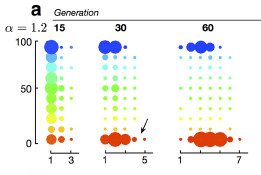There is evidence that the sharing of intentions was an important factor in the evolution of humans’ unique cognitive abilities. Here, for the first time, we formally model the coevolution of jointly intentional behavior and cumulative culture, showing that rapid techno-cultural advance goes hand in hand with the emergence of the ability to participate in jointly intentional behavior. Conversely, in the absence of opportunities for significant techno-cultural improvement, the ability to undertake jointly intentional behavior is selected against. Thus, we provide a unified mechanism for the suppression or emergence of shared intentions and collaborative behavior in humans, as well as a potential cause of inter-species diversity in the prevalence of such behavior.
Coauthored with Simon Angus.
Published in PLOS – Computational Biology (2015). Link to paper.
